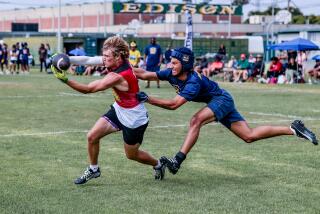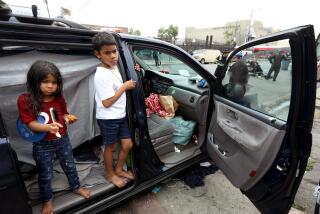A game of rebounds
You are a power forward and a crack addict. A point guard and a meth head. A center, but you canât stay away from booze and weed and women.
You spend most of your time in a crowded downtown homeless shelter on a shadowy stretch of hard streets and hard times. If youâre lucky, you live in the shelter. Every day is the same: classes, work, therapy, rules.
How do you get some happiness? How do you forget your troubles and reach back to the way you used to be, if only for an hour and a half? By playing on a team of transients in a league of last chances -- L.A.âs skid row basketball conference.
âRight about now, itâs about the best thing in life,â Robert Brown, 29, tells me. He is a guard on an eight-man squad representing the Union Rescue Mission. Slope-shouldered and soft-eyed, he says that before he finally moved into the mission, he slept under bridges near Venice Beach.
Playing in a league that began its fourth season last week, Brown says he has found something special. A little pride, a bit more confidence -- and a sense that he can make it through bad times without crumbling.
Now, minutes before a game Wednesday evening at Union Rescueâs indoor gym, I watch him nervously bounce a ball, warming up. Brown knows this isnât just another matchup; it is a rivalry game: Union Rescue versus a tall, talented, 10-man squad from the Midnight Mission, a shelter down the street.
Before the game, three of Brownâs teammates had quit. One headed back to the streets. The others -- who knows? To make up for the loss, two players who are neither addicts nor homeless will join the team. One is a student at L.A. Trade Tech. Another is Carl Williams, the shelterâs athletic director and coach.
The tipoff comes, and Midnight Mission snatches the ball. Once, in another life, several of the players on the Midnight Mission squad played sports in college. They have a center who can dunk.
In a flash, the score is Midnight Mission 6, Union Rescue 0.
On the sidelines, I stand next to a group of men who have left their bunks to watch the game. One is a thick-muscled man who volunteers that he has been sober for six months. âItâs all in Godâs hands now,â he says, over the shouting. âJust like this game.â
Union Rescue grabs and clutches and keeps the score close. Helping its cause is stocky Kevin Sanders, 37. Like so many others, he says his temptations are right outside the door -- life on the drug-laden streets. Sanders sees it in Biblical terms. The streets are Egypt. Heâs trying to escape and stay away for good.
That is reality. This is basketball. Sanders hits a jump shot. Then another. And another.
Midnight Mission screws up its fastbreaks. Most of its players are strong men, but also worried, broken men. As things unravel, their eyes avert too often to the ground.
The buzzer sounds. Halftime. Midnight Mission 24. Union Rescue 22.
Orlando Ward, the lanky Midnight Mission coach, wonât let his team give in. He knows the pitfalls. Before he turned his life around and became the Midnight Mission public affairs director, he says, he lived on the streets. âGet back to what you do,â Ward shouts. âYou are going to be fine.â
The players nod, but it doesnât work.
Their Union Rescue opponents play with nothing to lose. Brown, the guard who used to sleep under the Venice Beach bridges, might be slow and might not jump very well, but he scores.
The last five minutes are frantic.
Nobody wants to lose. Losing means wading through a weekâs worth of verbal beat downs from others in the shelter and from people who live on the sidewalks.
Jump shot, free throw, free throw. Now Union Rescue is up by six.
The Midnight Mission center puts on his black sweats and begins to stalk off the court.
âHey now, hey, come back here,â Ward shouts, his eyes intent and focused. âYou are on my team. We donât act that way on my team.â
The center walks back, muttering, certain his team is about to lose.
But this is skid row. Anything bad can happen, but sometimes, in the midst of the muck, miracles can happen too.
The clock runs and stops and runs again, apparently of its own volition. The scoreboard fails to record points after baskets. But it also records points after misses.
Nobody can figure it out.
Suddenly, there are three seconds left, and the score is knotted. If Union Rescue doesnât make a basket, the game will go into overtime.
Momentum is with Midnight Mission. Everyone thinks it will win.
Play begins, and the ball lands in Brownâs hands. There he is, unguarded, five feet from the basket, and nervous. Instead of dribbling, he freezes. Instead of shooting, he passes. Too late, the buzzer sounds. Overtime. And minutes later, the game ends in a Midnight Mission victory, 52-48.
I watch Brown trudge off the floor, shaking his head. This will be a test for him.
Midnight Mission, on the other hand, high-fives and hugs. Its playersâ eyes are no longer focused downward.
But these men face a test too.
It is the long walk down a dark, urine-stained sidewalk from Union Rescue to their shelter. The walk is only half a block, but it is full of reminders of what once was -- and, with one slip, could be again.
The team walks past a glassy-eyed man sitting alone in a wheelchair.
Past a teenager crouched in a cardboard box.
Past a woman lying on the ground.
Past three worn tents.
--



